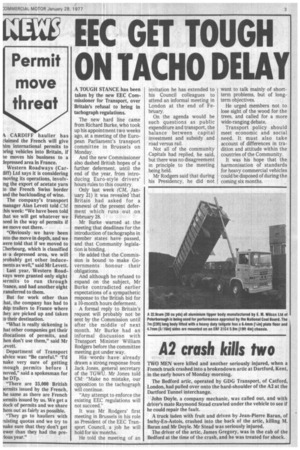EEC GET TOUGH ON TACHO DELAY
Page 5

If you've noticed an error in this article please click here to report it so we can fix it.
A TOUGH STANCE has been taken by the new EEC Commissioner for Transport, over Britain's refusal to bring in tachograph regulations.
The new hard line came from Richard Burke, who took up his appointment two weeks ago, at a meeting of the European Parliament's transport committee in Brussels on Monday.
And the new Commissioner also dashed British hopes of a further deferment, until the end of the year, from introducing Euro-style drivers' hours rules to this country.
Only last week (CM, January 21) it was revealed that Britain had asked for a renewal of the present deferment which runs out on February 28.
Mr Burke warned at the meeting that deadlines for the introduction of tachographs in member states have passed, and that Community legislation is binding.
He added that the Commission is bound to make Governments honour their obligations.
And although he refused to expand on the subject, Mr Burke contradicted earlier expectations of a sympathetic response to the British bid for a 10-month hours deferment.
A formal reply to Britain's request will probably not be sent by the Commission until after the middle of next month. Mr Burke had an informal discussion with Transport Minister William Rodgers before the committee meeting got under way.
His words have already drawn a strong response from Jack Jones, general secretary of the TGWU. Mr Jones told CM: "Make no mistake, our opposition to the tachograph will continue.
"Any attempt to enforce the existing EEC regulations will not succeed."
It was Mr Rodgers' first meeting in Brussels in his role as President of the EEC Transport Council, a job he will hold for six months.
He told the meeting of an invitation he has extended to his Council colleagues to attend an informal meeting in London at the end of February.
On the agenda would be such questions as public expenditure and transport, the balance between capital investment and subsidy and road versus rail.
Not all of the community Capitals had replied, he said, but there was no disagreement in principle to the meeting being held.
Mr Rodgers said that during his Presidency, he did not want to talk mainly of shortterm problems, but of longterm objectives.
He urged members not to lose sight of the wood for the trees, and called for a more wide-ranging debate.
Transport policy should meet economic and social need. It must also take account of differences in tradition and attitude within the countries of the Community.
It was his hope that the harmonisation of standards for heavy commercial vehicles could be disposed of during the coming six months.


































































































